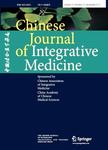Effectiveness of Acupuncture on Pain, Physical Function and Health-Related Quality of Life in Patients with Rheumatoid Arthritis: A Systematic Review of Quantitative Evidence
Effectiveness of Acupuncture on Pain, Physical Function and Health-Related Quality of Life in Patients with Rheumatoid Arthritis: A Systematic Review of Quantitative Evidence作者机构:Faculty of Medicine University of CoimbraInstitute of Science Biomedicine Abel Salazar University of Porto Porto PortugalHeidelberg School of Chinese Medicine Heidelberg Germany Institute of Science Biomedicine Abel Salazar University of Porto Porto Portugal Health Sciences Research Unit:Nursing (UICISA: E) Nursing School of Coimbra (ESEnfC) Portugal Centre for Evidenee Based Practice: A Joanna Briggs Institute Centre of Excellence Coimbra Portugal School of Health Sciences Macao Polytechnic Institute Macao SAR China Institute of Science Biomedicine Abel Salazar University of PortoHeidelberg School of Chinese Medicine Heidelberg Germany Faculty of Medicine University of Coimbra Portugal Health Sciences Research Unit: Nursing (UICISA:E) Nursing School of Coimbra (ESEnfC)Portugal Centre for Evidence Based Practice: A Joanna Briggs Institute Centre of Excellence Portugal
出 版 物:《Chinese Journal of Integrative Medicine》 (中国结合医学杂志(英文版))
年 卷 期:2019年第25卷第9期
页 面:704-709页
核心收录:
学科分类:10[医学]
主 题:acupuncture rheumatoid arthritis quality of life pain physical function randomized clinical trial
摘 要:Objective: To identify and synthesize the most recent available evidence of effectiveness of acupuncture on pain, physical function and health-related quality of life(HRQoL) in patients with rheumatoid arthritis(RA). Methods: A comprehensive search of 12 Western and Chinese databases was undertaken from their inception up to end of 2016. Randomized controlled trials(RCTs), concerning patients with RA treated with needle acupuncture, written in English, Portuguese, German or Chinese were included. Primary outcomes included pain, physical function and HRQoL. Secondary outcomes included morning stiffness, functional impairment, number of tender and swollen joints and serum concentrations of inflamatory markers. Methodological quality was assessed by three independent reviewers using the standardized critical appraisal instrument from the Joanna Briggs Institute Meta-Analysis of Statistics Assessment and Review Instrument. Results: Twenty-two studies met the inclusion criteria. Of those, 9 studies were excluded after assessment of their methodological quality. The remaining 13 original RCTs included 974 patients. Ten of these studies published in China, showed favorable statistical significant effects of acupuncture in relieving symptoms of RA compared with controls. Conclusions: Evidence suggests that acupuncture interventions may have a positive effect in pain relief, physical function and HRQo L in RA patients. However, due to the heterogeneity and methodologic limitations of the studies included in this systematic review, evidence is not strong enough to produce a best practice guideline.



